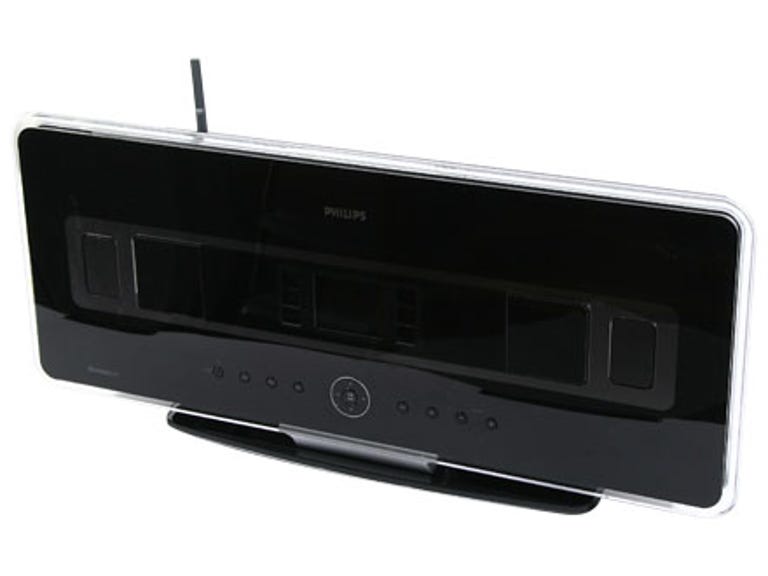 Why You Can Trust CNET
Why You Can Trust CNET Philips Streamium WACS7500 review: Philips Streamium WACS7500
If you're in the market for a straightforward system that streams your PC's music around your home, the Philips Streamium WACS7500 is certainly worth a closer look. It's comprised of a central jukebox with speakers and a hard drive, and a smaller speaker unit for another room
We weren't blown away last year by Philips' WACS7000, and we've been keen to see the company's follow-up for some time. Here it is: the Philips Streamium WACS7500 -- a package comprising a central hard drive-based music jukebox (the Centre), and a smaller version (the Station) that streams media wirelessly from the Centre.
The Good
The Bad
The Bottom Line
For the £699 Philips is asking for this, you're getting two complete products, both of which work with previous Streamium systems. The Station can be bought separately for £199 if you want to add one (or more) to your home music network. Has the Netherlands giant followed up the WACS7000 with a worthy successor?
Design
Both Centre and Station are built from identical glossy black plastic, which you'll either love or hate. Build quality is pretty good, though -- each system has a solid, weighty construction. Our first thought however, was that Philips has seriously upped the quality of the LCD screens. Although still pretty small, both now rock full colour in a fairly decent resolution, making navigation more enjoyable than on the WACS7000.

In fact, there's an LCD display (black and white) on the main remote control as well, and it mirrors the Centre's on-screen menus. This lets you browse its content and features using just the remote control, though you do need to be in the same room.
Features
An 80GB hard drive will hold rips of your CD collection, but don't worry about the low capacity, because you can only rip to MP3 format. Nope, this expensive jukebox won't let you rip to a lossless format. But 320Kbps MP3s will suffice for the vast majority of people and so 80GB will hold hundreds of your spinning discs, and a built-in, updatable Gracenote database adds artist and album info to the files.
You can also stream MP3, WMA or WAV files over your wired or wireless home network from a PC (simple software included) to both Centre and Station, or you can copy content from a PC directly to the Centre's HDD over Ethernet.
In addition to FM, Philips has enabled Internet radio in this incarnation of the WACS series. It's rather slow and nowhere near as pleasant to use as a dedicated system, such as Tangent's Quattro MKII. We didn't have much fun with it and there's no access to on-demand content from, for example, the BBC.
For Internet radio, the Station requires its own connection to the Internet via Wi-Fi or Ethernet -- it won't stream via the Centre. Conversely, content stored on the Centre's hard disk can be accessed through the identical menus on the smaller Station, or a number of Stations. A 'Music Follows Me' feature lets you disable and enable Stations in different rooms as you move around the house for uninterrupted album playback. Very cool if you're Spring cleaning.
Performance
Playing a CD is a piece of cake, and although ripping a CD to the hard disk is easy, it's unbearably slow, and you can't use any other feature of the system while it's ripping. Similarly, copying music from a PC over Ethernet directly on the Centre's HDD was intolerably sluggish. Although the 7500 would locate our networked computer, it would produce 'Not found' errors when trying to connect to it, though over simple home networks this is unlikely to be an issue.
We had problems on occasion getting the Station to connect to the Centre too, but once the systems played ball we found browsing content over the wireless connection extremely simple. If you're looking for a jukebox for your lounge and a media streamer for your bedroom, you won't get much more simple to use than this. When it behaves itself, that is.
On the main Centre, although on occasion a little harsh in the high end, sound quality is very clear, bright and well balanced. Bass is smooth, and not overpowering. Philips has made significant advances since the WACS7000 and the extra effort has paid off. It's no rival to a decent rack of separates and good speakers, but it's more than acceptable for an all-in-one.
Most types of music sounded fairly good, a notable favourite
being Ingrid Michaelson's terrific track Glass, which had decent
overall tones. Some drum 'n' bass from Pendulum was handled well, but
lacked that floor-shaking power the hardcore extremists will crave. The
smaller Station didn't impress with its sound, however. It's acceptable,
but it's a far cry from the often-decent sound of the main Centre.
Conclusion
The Philips Streamium WACS7500 is a costly system considering its lack of format support, small hard drive, slow performance and temperamental network functionality. It's uniquely useful as a whole package despite that, however. It's absolutely not for the audiophiles, as a Sonos system paired with a cheap home server and decent speakers will give you far better experience.
But for the average music fan who wants a multi-room streaming solution, it's very likable -- just be prepared to spend some time getting used to its quirks.
Edited by Jason Jenkins
Additional editing by Nick Hide
